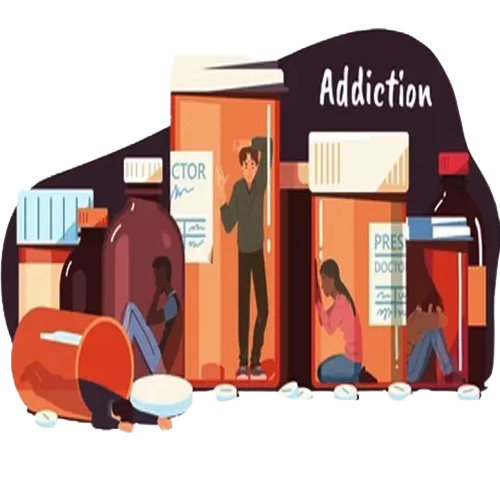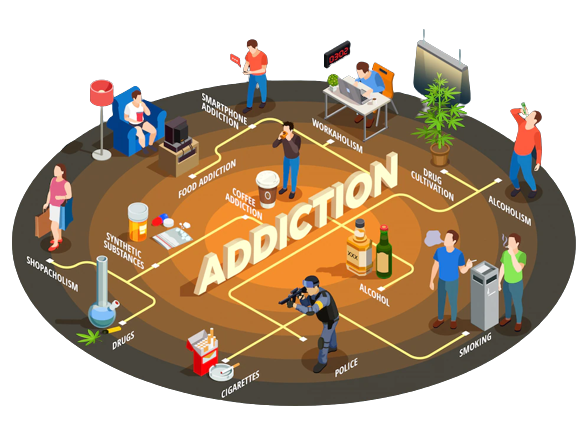addiction counselling
Addiction treatment, such as counselling, is crucial for helping people recognize the problem and take the steps to recovery.
An addiction is defined as a habit that has become out of control, to the extent that the individual is dependent on it for coping with everyday life. Addictions typically will have negative effects on the person’s emotional well-being and physical health, while also affecting those around them.
The psychological link, in particular, is what separates addition from habit. A habit is something people may do for fun, to relax or as a way of socialising. People can choose to stop a habit, and while it may take some time, can stop successfully. Addiction, however, can be an overwhelming need or compulsion to complete the act regularly, regardless of the time or place, in order to achieve the high. In short, a habit can be controlled, while an addiction cannot.


What is the difference between habit and addiction?
Addiction treatment, such as counselling, is crucial for helping people recognize the problem and take the steps to recovery.
An addiction is defined as a habit that has become out of control, to the extent that the individual is dependent on it for coping with everyday life. Addictions typically will have negative effects on the person’s emotional well-being and physical health, while also affecting those around them.
The psychological link, in particular, is what separates addition from habit. A habit is something people may do for fun, to relax or as a way of socialising. People can choose to stop a habit, and while it may take some time, can stop successfully. Addiction, however, can be an overwhelming need or compulsion to complete the act regularly, regardless of the time or place, in order to achieve the high. In short, a habit can be controlled, while an addiction cannot.
SYMPTOMS OF STRESS
What Causes Stress?
Stress can be caused by any type of physical or emotional stimulus or situation. Often, people speak of different types of stress such as work stress, relationship stress, or parenting stress. Some kinds of stress may be related to specific stages of life such as aging, pregnancy, the teen years, or the menopausal transition. Children can also be affected by stress.
Despite its source, any type of stress can become unmanageable or overwhelming. The following are risk factors for uncontrollable stress:
- Social and financial problems
- Physical or mental illness
- Lack of social support networks
- Family history of stress or family discord

Types of Addiction
PHYSICAL SYMPTOMS
- Headaches and migraines
- Muscle tension
- Loss of appetite
- Cravings
- Indigestion, or gas, acid reflux, Stomach aches
- Not wanting to be active
- Being accident prone
- Weight gain
- Weight loss
- Shortness of breath
- Feeling exhausted
- Sleeping a lot
- Having difficulty falling asleep or sustaining restful sleep
- Elevated blood pressure
- Cold hands
- Chest pain
- Lack of sex drive
- Jitters
- Diarrhoea
- Constipation
- Racing heartbeat
- Extreme PMS
- Lethargy
- Disturbing dreams or nightmares
- New aches or pains
- Inability to shake off a cold
- Excessive eating
- Stress eating
- Jaw pain or grinding of teeth
EMOTIONAL SYMPTOMS
- Rumination about or rehashing
- stressful memories
- Feeling defensive
- Crankiness
- Having difficulty remembering things
- Freezing or not being able to retrieve information
- Not being able to laugh or see the humor in situations
- Crying spells
- Change in voice tone
- Quick temper
- Racing thoughts
- Constant negative self-talk
- Depression
- Bad mood
- Feeling numb
SOCIAL SYMPTOMS
- Shyness
- Aggressiveness
- Loss of voice
- Becoming violent or lashing out
- Feeling isolated or lonely
- Seeking isolation; not wanting to go out
- Passivity
- Having difficulty following a conversation
- Lowered desire for sex
- Inability to get organized
- Confusion
- Forgetfulness
- Pessimistic outlook
- Using others
INTELLECTUAL SYMPTOMS
- Test anxiety
- Public speaking anxiety
- Having difficulty focusing
- Inability to prioritize
- Procrastination
- Making excuses, blaming
- Staring off into space; inability to focus
- Lack of motivation
- Irrational thoughts





